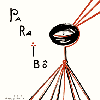Hugo Filho, "Paraibo"
 A reissue of a legendary private press Brazilian psych record, this disc represents a welcome document of this too rarely heard classic. With a mellow fusing of psych, folk and plain great songwriting, the album provides a number of instantly memorable sides with subtle and pleasing idiosyncrasies keeping them afloat.
A reissue of a legendary private press Brazilian psych record, this disc represents a welcome document of this too rarely heard classic. With a mellow fusing of psych, folk and plain great songwriting, the album provides a number of instantly memorable sides with subtle and pleasing idiosyncrasies keeping them afloat.
While the album will certainly not be a revelation to those already attuned to the likes of Os Mutantes, Gilberto Gil or Lula Cortes, it is a valuable document of the era's ripe musical scene. The opening title track's simple melody and stripped back production blend Byrds-like fluidity with a distinctly Brazilian sound. The song seems well aware of its strengths and, conversely, its limitations, making for a wholly mature sound whose restraint is as notable as its flavor.
At just under a half hour in length, the album has little time to waste, so each of the eight songs stick closely to the qualities of the opener, representing concise, almost sketch-like frameworks whose material alludes to an even grander potential. Yet the bedroom intimacy of songs like "Quem Me Viu Por Ai?" have a charm all its own, calm, relaxed, and distinctly summery.
Elsewhere the group does display some edge, albeit in a highly sun-splotched manner. The wah'd guitar line of "Meu Sol" hints at the underlying culture from which this album was born, but again it keeps its cards close to its chest. "Quero Voce, Voce" sprawls out a bit, drawing the pop elements out and combing them into a subtly psychedelic, tempo-shifting feel-good romp.
The understated mastery of form is again apparent on "Medu," eschewing the tpyically busy ornamentation of the time for sparsely accompanied, yet equally colorful and playful, melodic lines whose emotional depth is sincere without being cheesy, exciting without being intimidating. The snake charm line backing "Arcozelo" provides grim, prog-rock shadows to the otherwise buoyant backing band.
Considering the widespread love of Brazilian music from this era, it is little surprise that an album originally limited to 500 copies would fly under the radar. And while many releases are far more psychedelic or adventurous or overtly exciting, few are as consistent in material and realization. The closing "Valsa Para Fabrici," with its opening mournful guitar line, flute whisps and stuttering bird-like synthesizer, is as restrained as anything Mutantes ever released, but in this context the result is as surprising as much of that group's output, moving into gliding, surf's up guitar before simmering along into near circus theme fare. Again, the excitement here is in its material, not necessarilly its construction, and with material this good how can you blame them?
samples:


